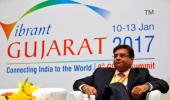'Governments that did not respect the central bank's independence would sooner or later come to rue the day they undermined the institution,' RBI Deputy Governor Viral Acharya warned on Friday.
The RBI does not consult us over important decisions, the government complained on Tuesday.
Clashes between the RBI and the government are not new.
Duvvuri Subbarao recounts how his tensions with P Chidambaram and Pranab Mukherjee, then finance ministers, over monetary policy spilled over into other issues at the central bank in this revealing excerpt from Who Moved My Interest Rate?, his memoir of his term as RBI governor.
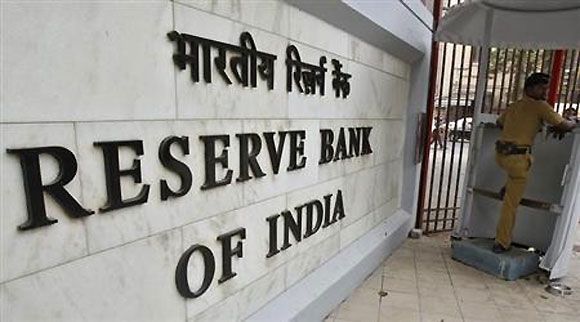
In mid-October 2008, even as the Reserve Bank was dousing the system with rupee and forex liquidity, Finance Minister (P) Chidambaram had suo moto constituted a committee on liquidity management, with Finance Secretary Arun Ramanathan as the chairman. The Reserve Bank was asked to nominate a representative on the committee.
I was annoyed and upset by this decision. Chidambaram had clearly overstepped into the RBI turf as liquidity management is a quintessential central bank function. Not only did he not consult me, but he had not even informed me of this before the notification was issued.
Coming as it did amidst a lot of suspicion in those early weeks of my tenure that I was a government lackey sent to the Reserve Bank to act at the government's bidding, the constitution of this committee only reinforced the view.
I called up Chidambaram and let him know in unequivocal terms that his action was totally inappropriate, and requested firmly that he dissolve the committee.
His argument was that when liquidity management was such a central concern, getting advice from external market participants would help us understand and respond to the ground reality in the market faster and better.
I granted that, but if he wanted external experience to be tapped, he could have advised me informally to constitute such a committee rather than taking the Reserve Bank for granted.
The call ended with my telling him that the Reserve Bank would not participate in the committee.
This skirmish with Chidambaram, who I believed pushed my candidature for the governor's job, so early in my tenure upset me a lot. Little did I know that this set the tone for what would be an uneasy relationship between us in the last year of my term.
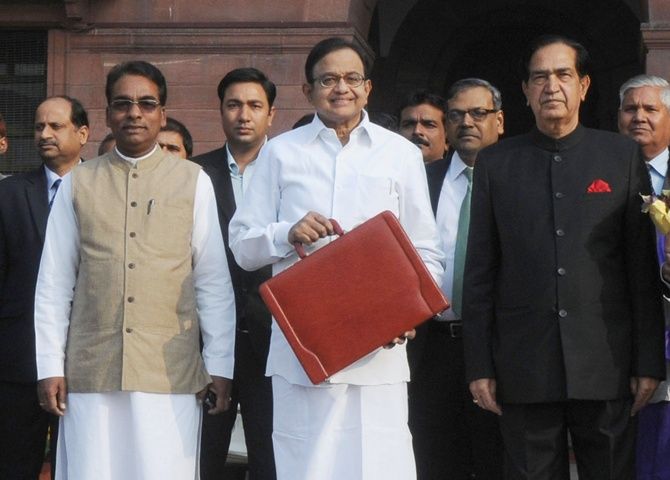
There was constant and decidedly unhelpful friction between the ministry of finance, under both Pranab Mukherjee and later Chidambaram, and the Reserve Bank on what the government saw as the Reserve Bank's unduly hawkish stance on interest rates, totally unmindful of growth concerns.
The distilled version of their argument went as follows. All the government's efforts to kickstart the supply response in the economy were being stymied by the high-interest regime of the Reserve Bank.
If only the Reserve Bank relaxed on the interest rate, investment would take off and launch the economy into a virtuous cycle of increasing growth and declining inflation.
When Chidambaram was asked in a media interaction in July 2013 why he was frustrated with the Reserve Bank when all it was doing was pursuing its mandate of price stability, he admitted that the Reserve Bank's mandate was indeed price stability but that 'mandate must be understood as part of a larger mandate of promoting growth'.
The clear implication was that the Reserve Bank was mistaken in interpreting its mandate.
I believe both Pranab Mukherjee and Chidambaram had erred in seeing the Reserve Bank as being fixated on inflation, unmindful of growth concerns.
On the contrary, the Reserve Bank interprets its mandate exactly as Chidambaram had said, although not as he implied. The Reserve Bank was targeting price stability precisely because it is a necessary condition for sustained growth...
The burden of my argument both in the public domain as well as internally to the government was that the Reserve Bank was running a tight monetary policy not because it did not care for growth but because it did care for growth.
But the government remained unpersuaded or chose to be unpersuaded.
In order to defend his position vis-a-vis the Reserve Bank and possibly to sound a conciliatory note, in a media conference in July 2013, Chidambaram had generalised this divide between governments and central banks by saying that 'governments are for growth and central banks are for price stability'.
This stereotyping was misinformed not only with reference to India but even from a broader experience...
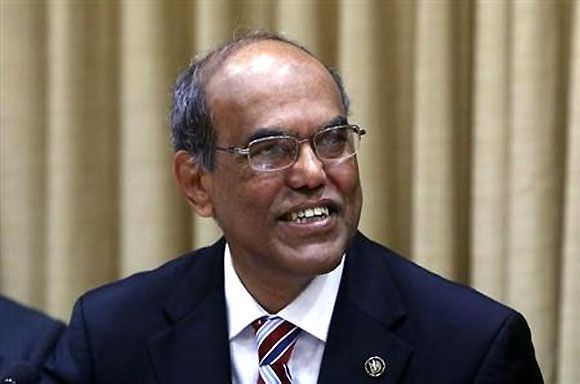
Although the high interest rate regime would be the main area of difference between the government and the Reserve Bank, there were other issues that stoked the friction even deeper.
One such issue which was almost always a point of contention in my pre-policy meeting with the finance minister was the estimate for growth that the Reserve Bank would be putting out in its policy document.
The government's pet peeve was that the Reserve Bank was being too cynical in its forecasts. Either the secretary of economic affairs or the chief economic adviser would contest our estimate with their assumptions and estimates which I thought were par for the course.
What used to irritate me, though, was that almost seamlessly the discussion would move from objective arguments to subjective considerations, with one of the senior officers suggesting that the Reserve Bank must project a higher growth rate and a lower inflation rate in order to share responsibility with the government for 'shoring up sentiment'.
Finance Secretary Arvind Mayaram went to the extent of saying in one meeting that 'whereas everywhere else in the world, governments and central banks are cooperating, here in India the Reserve Bank is being very recalcitrant'.
I was invariably discomfited and annoyed by these objections and insinuations. I was also often dismayed that the ministry of finance would seek a higher estimate for growth while simultaneously arguing for a softer stance on interest rate without seeing the obvious inconsistency between these two demands.
I used to take a consistent and firm position that the Reserve Bank cannot deviate from its best professional judgement just to doctor public sentiment.
Another constant source of friction used to be the position taken by the Reserve Bank on the government's fiscal stance.
The government's large fiscal deficit was one of the prime drivers of inflation and its inability to roll back expenditure undermined the Reserve Bank's anti-inflation stance. There was no way the Reserve Bank could tell a credible inflation story without pointing this out.
The finance ministry used to be irritated by the Reserve Bank making an issue out of its fiscal stance, and Pranab Mukherjee was always miffed about it; he clearly showed it even though he never said anything.
But for me, skirting around this issue was neither appropriate nor advisable.
It was my standard practice to apprise the prime minister too of our statement on the government's fiscal stance. He understood the economic logic, but always seemed uncomfortable with the Reserve Bank pointing it out.
He never intervened directly with me, but in early 2012, he told (DR C) Rangarajan, the chairman of his Economic Advisory Council and my former boss when I was secretary to the council, to convey to me that he did not expect Subbarao, 'who was finance secretary in the government and understood its political compulsions' to take such a strident stand on the fiscal stance.
I certainly had sympathy for this point of view but was unwilling and unable to show any accommodation..
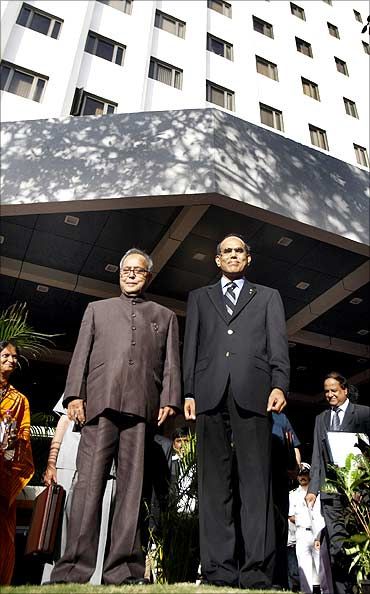
There is a price to pay, of course, for not falling in line. The government has several ways of showing its displeasure, and the way it chose to do so with me was by going against my recommendations in the reappointment of deputy governors in the Bank.
As the head of the Reserve Bank, enjoined with a public responsibility, the governor should have the privilege of selecting his team just as the prime minister has the prerogative of choosing his Cabinet.
There is no question, of course, that under law, it is the government that has the authority to appoint the governor and deputy governors of the Reserve Bank.
There are rules about eligibility and tenure, which have to be complied with, and the system of selection has to be fair, transparent and contestable.
Within that framework, a healthy convention should be to defer to the governor's recommendation on the appointment of deputy governors. That privilege was denied to me.
Usha Thorat, whose term as deputy governor was expiring in October 2010, was eligible for reappointment for another two years in accordance with the convention followed till then of reappointing deputy governors till they attained the age of 62 years.
Even as I was planning to formally write to the government recommending and requesting her reappointment, the secretary of the Department of Financial Services, R Gopalan, called one evening to say that the finance minister had approved the constitution of a committee to select Usha's successor.
I was pained that even if the government had decided to deviate from the standard practice of consulting the governor on the reappointment of an incumbent, they had not even told me about it before constituting a selection committee.
There was speculation that Pranab Mukherjee was irked by some regulatory decision taken on Usha's watch which, of course, came on top of his general unhappiness with me.
I sought a meeting with Pranab Mukherjee -- incidentally one of only two occasions when I met him one-on-one -- and requested that Usha be reappointed because of her competence, track record and because she met the eligibility criteria for reappointment.
He knew that he could not call into question Usha's competence or track record; it would have been presumptuous on his part to override my judgement on this issue with his own.
He pleaded rules instead, but I was prepared for that point. I told him that the government had reappointed Shyamala Gopinath, another deputy governor, an identical case, under the same rule, and added for effect that he was the finance minister who had approved it.
He didn't budge and Usha became a part of the price we had to pay for asserting the autonomy of the Reserve Bank.
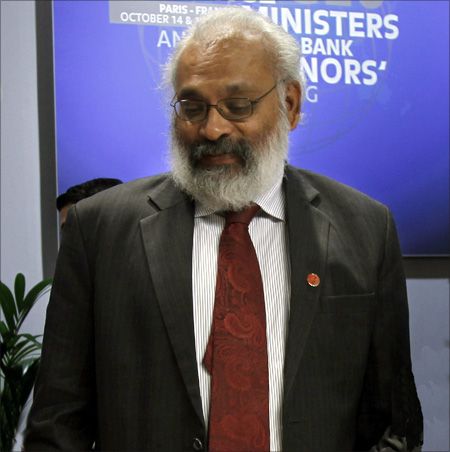
Photograph: Charles Platiau/Reuters
We had a replay of the same story in the case of reappointment of Subir Gokarn whose three-year tenure as deputy governor was expiring in December 2012.
By this time, Chidambaram had returned as finance minister. As early as in August 2012, I requested Chidambaram to reappoint Subir for two more years and told him and that I would send a formal recommendation accordingly.
I reiterated the request in October 2012.
Chidambaram was clearly disinclined to accede.
The reason he gave was that all of us who entered the Reserve Bank laterally had become hostage to the technocrats in the Reserve Bank and the government felt it necessary to bring some fresh thinking into the Reserve Bank. He was firm that we should go through a de novo selection process.
I reminded him that according to the rules framed by none other than him, Subir was eligible for reappointment; the question of opening up the position to other candidates would arise only if Subir was not recommended by the governor, which obviously was not the case.
Chidambaram did not budge and insisted that we go through a process of selection. He agreed though that Subir could be considered by the selection committee along with other candidates.
The selection committee, under my chairmanship, went through the due process and agreed on a panel of three candidates, with Subir Gokarn at the top of the list.
A couple of days later, P K Misra, secretary of the Department of Personnel, who was also a member of the selection committee, called me up to say that the minutes had to be redrafted since the rules did not allow for the committee to rank candidates in order of preference.
I was surprised because he, as the 'minder of rules', had not said so when we met in the committee. I told him that I could not agree to the redrafting of the minutes through a bilateral, oral arrangement and that we should follow the due process.
He should write to me explaining the rule position, then we should reconvene the committee to review the decision, and if agreed, dispense with the ranking. I did not hear from him again on this.
Subir's tenure was coming to an end on December 31, 2012. But even after Christmas, there was no news from the government.
I was hoping that since his name was on top of the list, the finance minister would, even if reluctantly, acquiesce.
We had a farewell function planned on December 31 to bid farewell to a couple of senior officers who were superannuating that day. My staff asked if we should cover Subir too under this farewell. I said 'no' in the hope that the reappointment would come through literally even at the eleventh hour.
In the event, I underestimated Chidambaram's desire to bring 'fresh thinking' into the Reserve Bank. Later that afternoon, we got the news that Subir's appointment was not being renewed.
In an article Silencing the RBI, Rajeev Malik, a columnist, wrote: 'In some ways, the government's decision not to extend Mr Gokarn's term appears to be a censure of Governor Subbarao. His second term ends in September this year, so he could not be shown the door before without rattling investors. Perhaps it was unfortunate that Mr Gokarn's term ended when it did. It appears to have made him an easy target. After all, the current government has not been shy of messing around with institutions -- the RBI is just the latest addition to that list.'
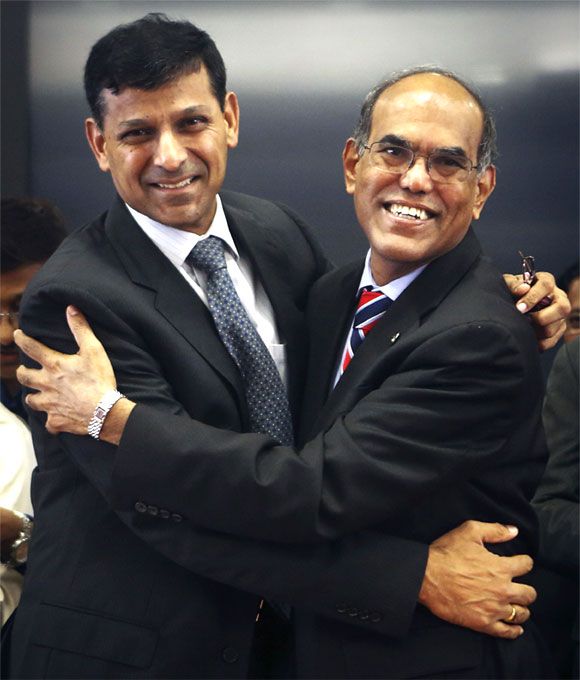
Another mischievous, if also clumsy, attempt by the government to assault the autonomy of the Reserve Bank came by way of appointing the directors on the central board of the Bank.
As per law, it is the government's prerogative to appoint the directors, but the law also guarantees the directors so appointed a four-year term. In other words, the government cannot recall any director at will during the four-year tenure.
Presumably, the intent behind this provision was to ensure that the directors acted independently without any threat of the government 'showing its displeasure' by terminating their appointment.
It has been the standard practice for the government to conform to the wording of the law with regard to the guaranteed four-year term. While appointing a fresh batch of directors in 2011, however, the government changed the wording in the notification to say: 'xxx is appointed as a Director on the Central Board of the Reserve Bank for a term of four years or until further orders whichever is earlier' (emphasis mine).
We were surprised by this change in wording. Maybe a clerical error, I thought. That didn't seem likely though as all they had to do was copy the standard wording of the previous notifications.
Having worked in the government, I am aware of the power of precedents; breaking a precedent requires a clear application of mind. Here, someone in the government did apply his mind to incorporate a new provision so as to keep the directors on the board of the Reserve Bank on leash, not realising that it was against the law.
We pointed this out to the government and they issued an amendment to bring the wording back to the standard format. Yes, we held our ground, but it would have been better if the matter hadn't arisen at all.
Edited excerpts from Duvvuri Subbarao's Who Moved My Interest Rate? Leading the Reserve Bank Through Five Turbulent Years, Rs 699, reprinted with permission from Penguin Random House.




